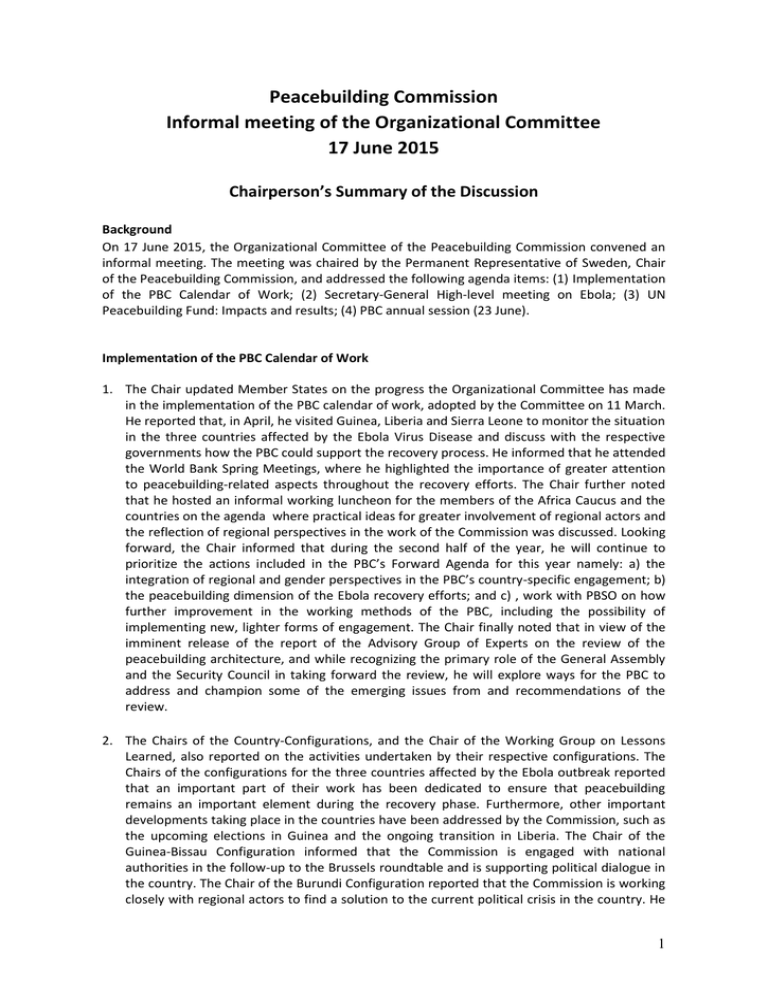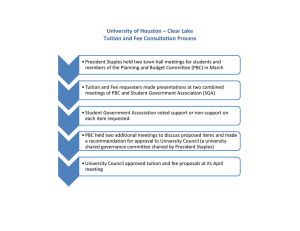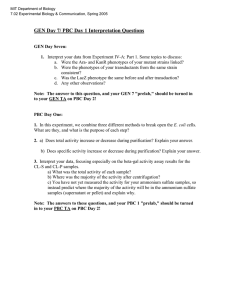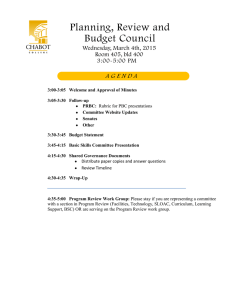Chair's summary of the informal meeting of 17 June
advertisement

Peacebuilding Commission Informal meeting of the Organizational Committee 17 June 2015 Chairperson’s Summary of the Discussion Background On 17 June 2015, the Organizational Committee of the Peacebuilding Commission convened an informal meeting. The meeting was chaired by the Permanent Representative of Sweden, Chair of the Peacebuilding Commission, and addressed the following agenda items: (1) Implementation of the PBC Calendar of Work; (2) Secretary-General High-level meeting on Ebola; (3) UN Peacebuilding Fund: Impacts and results; (4) PBC annual session (23 June). Implementation of the PBC Calendar of Work 1. The Chair updated Member States on the progress the Organizational Committee has made in the implementation of the PBC calendar of work, adopted by the Committee on 11 March. He reported that, in April, he visited Guinea, Liberia and Sierra Leone to monitor the situation in the three countries affected by the Ebola Virus Disease and discuss with the respective governments how the PBC could support the recovery process. He informed that he attended the World Bank Spring Meetings, where he highlighted the importance of greater attention to peacebuilding-related aspects throughout the recovery efforts. The Chair further noted that he hosted an informal working luncheon for the members of the Africa Caucus and the countries on the agenda where practical ideas for greater involvement of regional actors and the reflection of regional perspectives in the work of the Commission was discussed. Looking forward, the Chair informed that during the second half of the year, he will continue to prioritize the actions included in the PBC’s Forward Agenda for this year namely: a) the integration of regional and gender perspectives in the PBC’s country-specific engagement; b) the peacebuilding dimension of the Ebola recovery efforts; and c) , work with PBSO on how further improvement in the working methods of the PBC, including the possibility of implementing new, lighter forms of engagement. The Chair finally noted that in view of the imminent release of the report of the Advisory Group of Experts on the review of the peacebuilding architecture, and while recognizing the primary role of the General Assembly and the Security Council in taking forward the review, he will explore ways for the PBC to address and champion some of the emerging issues from and recommendations of the review. 2. The Chairs of the Country-Configurations, and the Chair of the Working Group on Lessons Learned, also reported on the activities undertaken by their respective configurations. The Chairs of the configurations for the three countries affected by the Ebola outbreak reported that an important part of their work has been dedicated to ensure that peacebuilding remains an important element during the recovery phase. Furthermore, other important developments taking place in the countries have been addressed by the Commission, such as the upcoming elections in Guinea and the ongoing transition in Liberia. The Chair of the Guinea-Bissau Configuration informed that the Commission is engaged with national authorities in the follow-up to the Brussels roundtable and is supporting political dialogue in the country. The Chair of the Burundi Configuration reported that the Commission is working closely with regional actors to find a solution to the current political crisis in the country. He 1 also informed that he intends to visit Burundi at the beginning of July to further engage national authorities and regional actors. In a subsequent intervention by one delegation, the importance of the PBC aligning its position on the situation in Burundi with regional actors (the AU and the EAC) was particularly emphasized. Finally, the Chair of the WGLL reported that the WGLL decided to focus its work for 2015 on the issue of Institution Building and that a first meeting took place in May to discuss the topic of extension of state authority. Secretary-General High-level meeting on Ebola 3. The representative of UNDP briefed the Committee on the preparation for the upcoming Secretary-General High-level Meeting on Ebola. He noted that early recovery is key to “staying at zero” Ebola cases and that, in order to strengthen the recovery phase, the Secretary-General has decided to host an international conference on Ebola recovery on 10 July 2015, in cooperation with the Governments of Guinea, Liberia and Sierra Leone and with the support of the African Development Bank, the African Union, the European Union and the World Bank. UNDP welcomed the decision to invite the PBC Chair to address the conference and reaffirmed that peacebuilding is a key aspect in this phase for the affected countries. UNDP also noted that the purpose of the conference would be to focus international attention specifically on the need for targeted investments for the three countries to support recovery priorities over a 24 month timeframe to enable countries to make the transition to recovery. 4. UNDP further informed that a technical meeting is scheduled for 9 July. The purpose of that meeting will be to discuss different dimensions of the recovery efforts with a broader set of actors, including government, the donor community and the private sector. The technical meeting is structured around four main thematic discussions: 1) Health, & Nutrition; 2) Governance, Peacebuilding and Social cohesion; 3) Education, social and child protection and Basic Services; and 4) Socio-economic revitalization. It was confirmed that the Chair of the PBC was also invited to participate in the technical discussion on governance, peacebuilding and social cohesion. 5. Member States welcomed the presentation by UNDP, expressed their appreciation for the invitation extended to the PBC Chair and underlined the importance they collectively attach to ensuring the integration of a peacebuilding approach into recovery. Delegations welcomed the decision to include representatives of the private sector in the technical meeting and reiterated their commitment to support the countries affected by Ebola. UN Peacebuilding Fund: Impacts and results 6. The Assistant Secretary-General for Peacebuilding Support (ASG) emphasized that a priority role for the PBF was to work synergistically with the PBC. For those countries on the agenda of the PBC, he confirmed that the PBC agenda countries remain a financial priority for the PBF. He further stressed that PBF financing is guided by the PBC’s political engagement, and reinforces the PBC’s advocacy with national stakeholders and the international community. In all six PBC countries, the PBF has used either longer-term Priority Plans or the more flexible Immediate Response Facility to support PBC’s political engagement.. The ASG highlighted that 2015 is the year of reviews, and he expected that these reviews will underline the importance of the synergistic and mutually reinforcing relations between the PBC & the PBF. 2 7. At the same time, PBF aims to be as helpful as possible to the broader UN peacebuilding work, and that means extending its support to countries that are not on the PBC’s agenda. The ASG highlighted that having a more dynamic and flexible PBC would greatly facilitate the ability of the PBF to expand its engagement in support of the Commission’s country-specific engagement. The PBC is expected to attend to global peacebuilding issues. Through regular interaction, the work of the PBF in the countries that are not on the PBC’s agenda would help the PBC keep track of peacebuilding-related developments. It is in this context that PBSO seized the opportunity offered by this meeting to brief the PBC on PBF’s work and to look at the case study of Papua New Guinea. 8. The Chief of the Financing for Peacebuilding Branch of PBSO provided a short update of the PBF’s programming priorities for 2015, with a specific emphasis on the work in the 6 PBC countries. From amongst the many programme design efforts this year, he noted specifically the following: ambitions to enable budget support in Somalia, the use of existing national stabilization strategies in the Democratic Republic of Congo, additional capacity building of civil society to enable their engagement in peacebuilding prioritization in Madagascar, and cross-border issues between Kyrgyzstan and Tajikistan. Concerning the countries on the agenda of the Peacebuilding Commission, priorities include, support for dialogue activities with civil society (Burundi); support for Bangui Forum implementation (CAR); small, additional financing focused on the electoral context (Guinea); New grant being finalized as a follow-up to the outcome of the Brussels Roundtable(Guinea-Bissau); review of current programme in post-Ebola and UNMIL pre-drawdown context(Liberia); possible new PRF grant to accompany PBC’s engagement in post-UNIPSIL context(Sierra Leone). 9. The Chair invited the Permanent Representative of Papua New Guinea, H.E. Mr. Robert Aisi, to make a short statement with regards to the peacebuilding priorities in the Autonomous Region of Bougainville and the support of the Peacebuilding Fund. Ambassador Aisi reminded the Committee about the prolonged conflict in Bougainville which took place through the 1990s and resulted in the deaths of thousands of people. The conflict ended with the signing of the Bougainville Peace Accord in 2001, but many of the wounds and grievances have persisted. He highlighted that the successive Governments of Papua New Guinea made the peace process in Bougainville their priority, including by reflecting this in the national budget. He further emphasized that national ownership has been key in the whole process following the signing of the Bougainville Peace Agreement. 10. Ambassador Aisi acknowledged that the UN has been a major partner with regards to peacebuilding in Bougainville. More recently, the support from the Peacebuilding Fund is highly valuable to Papua New Guinea and it will strengthen the contribution of the UN family to the major peacebuilding needs in Bougainville. 11. He informed the Committee that to date PBF had allocated $9.03 million to peacebuilding activities in Bougainville, including $1.43 million towards activities supporting the empowerment of women and promoting a peaceful climate around the upcoming referendum on the status of Bougainville. The related projects are being finalized with the support of the Government and partners on the ground and will help address the key remaining tensions in the lead-up to the referendum, based on the findings of a participatory Peace and Development Analysis, supported by the PBF and Interpeace. 12. Member States welcomed the briefings and recognized the importance of PBF’s work in continuing to provide speedy, catalytic and responsive support to countries, including Papua New Guinea. Given the limited size of PBF and the significant level of peacebuilding needs 3 globally, one delegation noted that PBF could play a particularly important and catalytic role in the areas of security, justice and political processes and should continue to explore ways of partnering with international financial institutions. 13. The Chair concluded the session by thanking the representative of Papua New Guinea for sharing the experience of his country and the emphasis placed on national leadership and ownership and noted that the PBC would welcome further updates as and when Papua New Guinea deems it useful. He also stressed the importance of following situations and peacebuilding needs beyond the countries on the PBC agenda and, especially where the PBF is invested. PBC annual session (23 June) 14. The Chair informed that the final steps in the preparation for the PBC Annual Session of 23 June are ongoing and he invited Member States to finalize the registration process required to attend the working sessions. He also informed delegations that, in order for ensure that the Annual Session to produce a concrete outcome, a draft statement was circulated with a view of adoption by the Commission at the closing segment of the Session. ASG FernandezTaranco informed that the programme is being finalized and that the Annual Session represents a timely opportunity for the PBC to discuss a highly relevant theme to the future of the UN and the international community’s response to conflict and post-conflict situations. Other matters 15. The Chair informed that, as per the established practice, an informal interactive dialogue between members of the Security Council and the PBC Chairs has been scheduled for 25 June. He noted that the meeting, organized in collaboration with the Presidency of the Council for June (Malaysia) will represent an important opportunity to further strengthen the relations between the two bodies and to ensure that the advisory role of the Commission is fully utilized by the Council. The representative of Malaysia noted that the Presidency has extended invitations to representatives of the panels/groups undertaking the ongoing reviews of the peacebuilding architecture, the peace operations and SCR 1325 (2001) on Women, peace and Security to participate in the dialogue. **** 4


